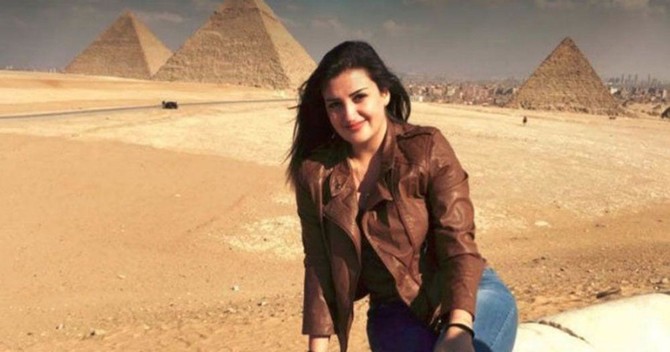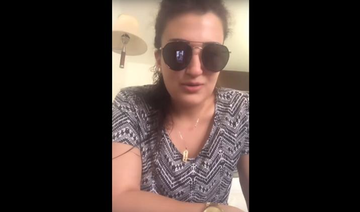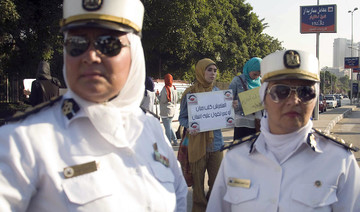CAIRO: Egyptian authorities deported a Lebanese woman who was jailed for insulting Egyptians in a video she posted online, days after she was sentenced to a suspended one-year sentence, her lawyer and airport officials said.
Mona El-Mazbouh was deported Thursday. She was arrested in May after she posted a 10-minute video in which she used profanities to describe her vacation in Cairo, where she said she was sexually harassed. She calls Egyptians the “dirtiest people.” She later posted a video apologizing, saying “I definitely didn’t mean to offend all Egyptians.”
In July, the 24-year-old el-Mazabou was sentenced to 11 years in prison but the sentence was later reduced to eight years. A higher court earlier this month approved her appeal and handed her a suspended one-year sentence.
She was released and boarded a flight with her family to Lebanon late Thursday after paying a fine of 10,700 Egyptian pounds (around $598), her lawyer Emad Kamal said.
Airport officials confirmed her deportation. They said El-Mazbouh arrived at the airport with police directly after she was released. The officials spoke on condition of anonymity because they were not authorized to brief the media.
El-Mazbouh posted on her Facebook account photos of her arrival at Beirut International Airport. “It was a nice experience. ... I was there (in prison) for three months and a half ... that’s it. I am good, thanks God,” she said in a posted video.
In her first video, El-Mazbouh said she was sexually harassed by taxi drivers and young men in Cairo. She also said her money was stolen at some point during her vacation.
She was arrested after the video went viral and accused by authorities of “deliberately broadcasting false rumors which aim to undermine society and attack religions.”
Sexual harassment, mostly ranging from catcalls to occasional pinching or grabbing, is rampant in Egypt. Polls have found that a majority of both men and women in the conservative Muslim country believe it is justified if women dress “provocatively” in public.
The problem of sexual harassment in Egypt gained worldwide attention during and after the 2011 uprising that toppled President Hosni Mubarak, when women were harassed, groped and, in some cases, beaten and sexually assaulted during mass protests.
A study released last year by the Thomson Reuters Foundation ranked Cairo as the most dangerous megacity in the world for women. President Abdel-Fattah El-Sisi questioned its findings, but acknowledged in TV comments last November that “there is sexual harassment in Egypt. There is a big percentage, but not to say it is the worst.”
Another last year by UN Women and Promundo, a non-governmental organization, found that nearly 60 percent of Egyptian women say they have been sexually harassed, and nearly 65 percent of men acknowledge harassing women, though they mainly admitted to ogling.
The poll, which surveyed 1,380 men and 1,402 women in five governorates, found that 74 percent of men — and 84 percent of women — agreed that “women who dress provocatively deserve to be harassed.” Forty-three percent of men said women “like the attention” when men harass them.
Only 20 percent of women said they did.



























